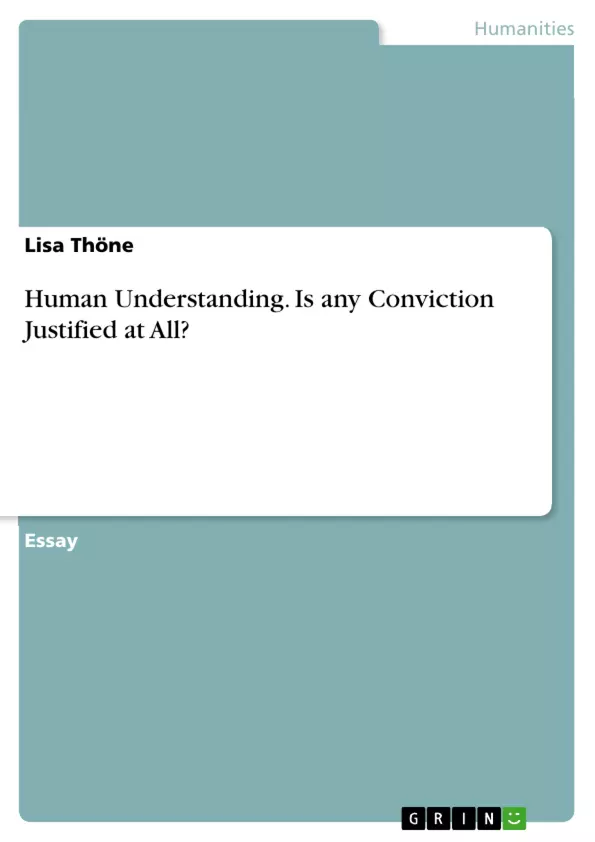This paper discusses the philosophical question whether any conviction is justified at all. The focus is set on innateness therefore, because when something is innate, it would mean that we can be certain that our knowledge comes from a reliable source, which then necessarily must be a higher creature, and that our convictions are justified only by that fact. But my aim is to prove that our knowledge is not innate and thus our conviction of so many things is questioned.
Inhaltsverzeichnis (Table of Contents)
- Introduction
- Universal assent to some principles
- The use of reason for justifying convictions
- Why don't we know about innate principles?
- The moral principles in our convictions
- God's role in our convictions
- Conclusion
Zielsetzung und Themenschwerpunkte (Objectives and Key Themes)
This presentation aims to explore the question of whether any conviction can be truly justified, focusing on the concept of innateness. The argument presented seeks to demonstrate that our knowledge is not innate, thereby questioning the justification of many of our convictions.
- The role of innate principles in justifying convictions
- The limitations of universal assent and its connection to a higher source
- The use of reason and its relevance to innate knowledge
- The relationship between moral convictions and innate ideas
- The influence of God and the concept of a reliable source in our convictions
Zusammenfassung der Kapitel (Chapter Summaries)
- Introduction: Introduces the topic of the presentation, focusing on the question of whether any conviction can be justified and emphasizing the significance of innateness as a potential source of reliable knowledge.
- Universal assent to some principles: Explores the concept of universal assent and its connection to innate principles, arguing that the idea of universally accepted principles is not universally true and that the notion of a higher source can be attributed to a desire for ease rather than a genuine pursuit of truth.
- The use of reason for justifying convictions: Examines the role of reason in justifying convictions, arguing that the need for justification suggests that knowledge is not innate and that we actively seek reasons for our beliefs.
- Why don't we know about innate principles?: Questions the absence of knowledge about innate principles, challenging the idea that we are unaware of them due to misdirection and highlighting the inconsistency of this explanation with the experiences of children and mentally disabled persons.
- The moral principles in our convictions: Analyzes the relationship between moral convictions and innate ideas, suggesting that criminals' acceptance of moral principles while failing to act upon them contradicts the idea of innate morality, and pointing to the diversity of moral beliefs as evidence against universally given moral principles.
- God's role in our convictions: Discusses the role of God in the context of innate principles, questioning the existence of a higher creature as a reliable source and arguing that God's role in creating obedient individuals is not supported by the reality of disobedience.
Schlüsselwörter (Keywords)
The core concepts and themes explored in this presentation include innateness, universal assent, reason, justification, convictions, moral principles, God, and the idea of a reliable source. These terms encapsulate the fundamental questions regarding the origin and justification of knowledge and our beliefs.
- Quote paper
- Lisa Thöne (Author), 2016, Human Understanding. Is any Conviction Justified at All?, Munich, GRIN Verlag, https://www.hausarbeiten.de/document/1475449


